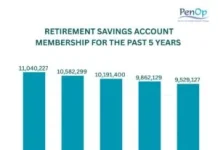The total value of pension assets in the country dropped by N77 billion to N12.299 trillion as of January 31, 2021, compared with the N12.306 trillion it was as of December 31, 2020.
The National Pension Commission (PenCom), in its latest monthly report on the pension fund portfolio obtained on its website yesterday, put the total amount of the pension funds invested in FGN Securities in January at N8.107 trillion, compared with the N8.131 trillion recorded in December. The amount invested in corporate debt securities in the review period stood at N836 billion, same as the previous month.
The report showed that while a total of N1.687 trillion of the pension fund was invested in local money market securities in December, it reduced to N1.647 trillion in January; while the amount invested by the Pension Fund Administrators (PFAs) in mutual funds was raised to a total of N162.090 billion in January, higher than a total of N161.392 billion recorded the previous month.
The report showed that the total Retired Savings Account (RSA) registered as of January 31 was 9,236,841, slightly higher than the 9,215,788 it was the previous month.
READ ALSO: Bizwatch Nigeria Set To Host Insurance Webinar On March 31
Reacting to the drop in pension assets, analysts said the decline was a result of the increase in the unemployment rate as well as the low yield environment.
However, they stated that the economy was on a recovery path, and the trend would soon change.
The Head Research, United Capital, Mr. Wale Olusi, said: “If you go by the unemployment figures and the impact of the pandemic from last year and reduction in the numbers of new entrants into the job market, salary cuts and the number of job losses may be an obvious factor to consider.
“If the economy recovers fully, and fresh school leavers get jobs, experienced workers get promoted, the number should rebound. I don’t think the decline should continue.”
On her part, the Head, Fund, and Investment Manager Ratings, Agusto &Co, Wonuola Kunle-Bello, said: “The lower contributions are reflective of the impact of the pandemic on Nigeria’s labour market. In the past year, there have been significant layoffs and salary reductions as businesses shuttered and the economic impact of the virus hit. There have also been lower than usual first-time employments than pre-COVID years.
“It’s unlikely that the decline will continue as we expect businesses and the economy at large to continue on a path to recovery, which will mean higher employee levels albeit marginal increment and consequently higher contributions.”













